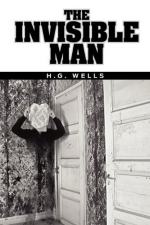“Not quite so badly,” said Kemp, “but I can imagine it.”
“I could have smashed the silly devils. At last, faint with the desire for tasteful food, I went into another place and demanded a private room. ‘I am disfigured,’ I said. ‘Badly.’ They looked at me curiously, but of course it was not their affair—and so at last I got my lunch. It was not particularly well served, but it sufficed; and when I had had it, I sat over a cigar, trying to plan my line of action. And outside a snowstorm was beginning.
“The more I thought it over, Kemp, the more I realised what a helpless absurdity an Invisible Man was—in a cold and dirty climate and a crowded civilised city. Before I made this mad experiment I had dreamt of a thousand advantages. That afternoon it seemed all disappointment. I went over the heads of the things a man reckons desirable. No doubt invisibility made it possible to get them, but it made it impossible to enjoy them when they are got. Ambition—what is the good of pride of place when you cannot appear there? What is the good of the love of woman when her name must needs be Delilah? I have no taste for politics, for the blackguardisms of fame, for philanthropy, for sport. What was I to do? And for this I had become a wrapped-up mystery, a swathed and bandaged caricature of a man!”
He paused, and his attitude suggested a roving glance at the window.
“But how did you get to Iping?” said Kemp, anxious to keep his guest busy talking.
“I went there to work. I had one hope. It was a half idea! I have it still. It is a full blown idea now. A way of getting back! Of restoring what I have done. When I choose. When I have done all I mean to do invisibly. And that is what I chiefly want to talk to you about now.”
“You went straight to Iping?”
“Yes. I had simply to get my three volumes of memoranda and my cheque-book, my luggage and underclothing, order a quantity of chemicals to work out this idea of mine—I will show you the calculations as soon as I get my books—and then I started. Jove! I remember the snowstorm now, and the accursed bother it was to keep the snow from damping my pasteboard nose.”
“At the end,” said Kemp, “the day before yesterday, when they found you out, you rather—to judge by the papers—”
“I did. Rather. Did I kill that fool of a constable?”
“No,” said Kemp. “He’s expected to recover.”
“That’s his luck, then. I clean lost my temper, the fools! Why couldn’t they leave me alone? And that grocer lout?”
“There are no deaths expected,” said Kemp.
“I don’t know about that tramp of mine,” said the Invisible Man, with an unpleasant laugh.
“By Heaven, Kemp, you don’t know what rage is! ... To have worked for years, to have planned and plotted, and then to get some fumbling purblind idiot messing across your course! ... Every conceivable sort of silly creature that has ever been created has been sent to cross me.




